Deep in the remote Papuan jungles of Indonesia, the Korowai tribe is known to kill and consume fellow tribesmen who they believe to be "witches" known as khakhua.
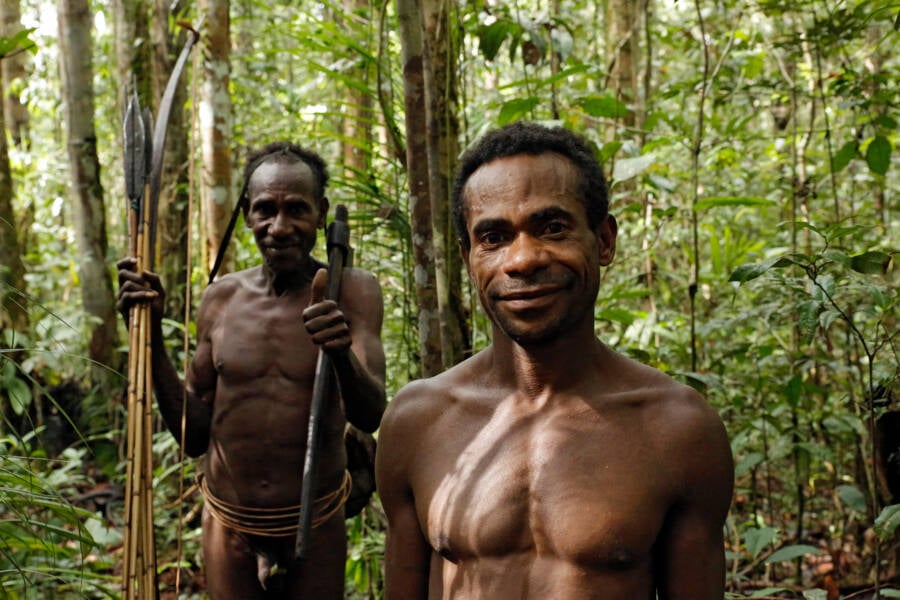
Daniel Lamborn / Alamy Stock PhotoTwo members of the Korowai tribe in Papua, Indonesia. 2016.
The jungles of Papua, Indonesia, feel like another world. Hot, humid, and filled with poisonous snakes and giant spiders, they’re a far cry from the country’s bustling capital of Jakarta, some 2,000 miles away. They’re also home to the Korowai tribe, a people who lived in isolation until the 1970s.
Long untouched by the outside world, the Korowai live in elaborate treehouses that can tower more than 100 feet above the jungle floor, keep dogs and pigs as pets, and spent centuries surviving as hunter-gatherers.
But that’s not why most people find them so fascinating.
The Korowai have drawn attention because of claims that they practice cannibalism. They are purportedly known to execute male “witches” known as khakhua — and then consume their flesh.
This is the story of the purported cannibal tribe, from their first contact with the outside world to what life is like for them today.
Who Are The Korowai? Inside The Secluded Tribe’s Culture
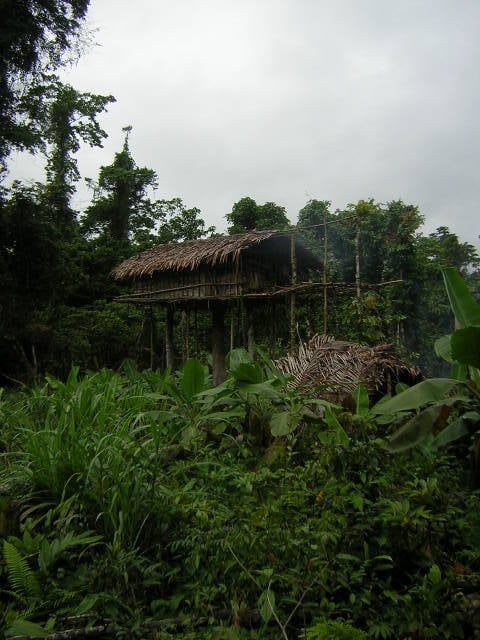
♪ ~/FlickrA Korowai treehouse in the jungle.
Until the 20th century, most of the world didn’t know anything about the Korowai tribe. The first documented encounter between the Korowai and Westerners wasn’t until the 1970s.
In 1974, a group of Western scientists first encountered the Korowai and made some basic observations about them. In 1978, Dutch missionary Reverend Johannes Veldhuizen also interacted with the tribe, but he swiftly dropped any plans to try to convert them to Christianity.
“A very powerful mountain god warned the Korowai that their world would be destroyed by an earthquake if outsiders came into their land to change their customs,” Veldhuizen explained to Paul Raffaele during an interview published in a Smithsonian Magazine article in 2006.
He continued: “So we went as guests, rather than as conquerors, and never put any pressure on the Korowai to change their ways.”
Today, communities downriver have been exposed to outsiders, though people further inland are still very isolated. As such, the world has now learned about the Korowai — and the Korowai have learned about the world.
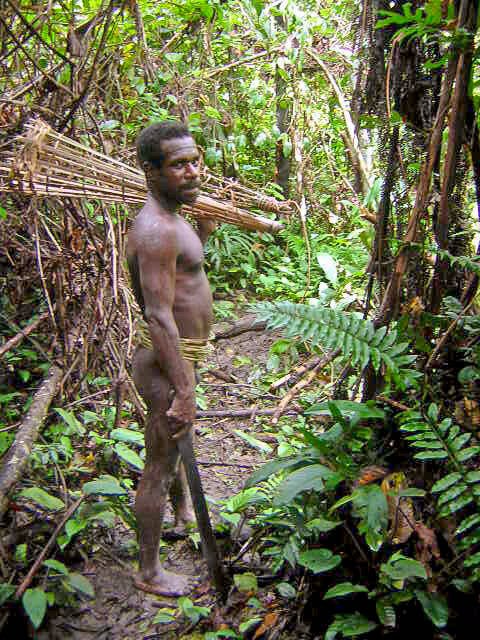
710928003/Wikimedia CommonsA Korowai tribesman. It’s believed that some 4,000 Korowai live in the jungles of Papua.
An estimated 4,000 Korowai tribespeople live in the jungles of southeastern Papua, the Indonesian province that makes up the western half of the island of New Guinea. Unlike most civilizations — who inhabit shelters on the ground — the Korowai are known for building treehouses (called khaim) that tower up to 140 feet above the jungle floor. (However, the University of Cambridge reported in 2021 that while the Korowai do live in treehouses, they likely build extra tall ones for show to impress outsiders.)
Like any culture, the tribe ascribes to certain beliefs and habits. Authentic Indonesia reports that they keep pigs and dogs and pets, that young women are married after they first menstruate, and that they carry out special rituals to mark births, weddings, and deaths.
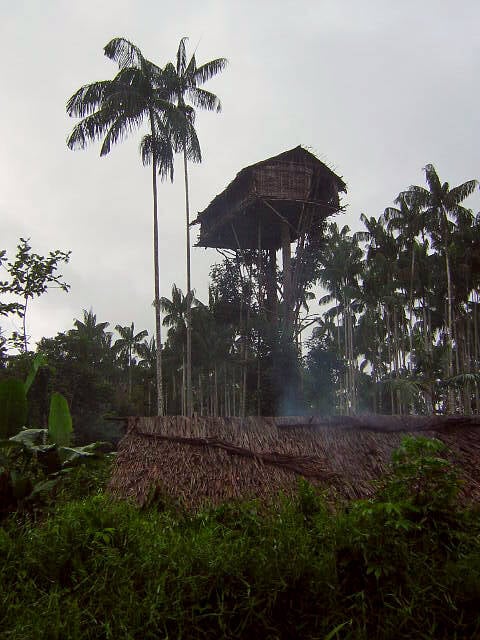
♪ ~/Wikimedia CommonsAnother view of a Korowai treehouse. While these houses do exist, some claim that the extra tall ones are uninhabited and are built to awe outsiders.
In recent years, the Korowai tribe has been subject to a great deal of attention — because of claims that they practice cannibalism.
Cannibalism Claims Surrounding The Korowai Tribe
Perhaps the best documented explanation of cannibalism among the Korowai comes from Paul Raffaele, an Australian journalist who wrote about his encounter with the tribe for Smithsonian Magazine in 2006.
According to Raffaele’s reporting, the Korowai are known to kill khakhua, or male witches. Because the tribe has little knowledge of germs or disease, khakhua are blamed for many deaths caused by illness. After the khakhua are executed, male tribe members consume their flesh.
“Just before my cousin died he told me that [a man named] Bunop was a khakhua and was eating him from the inside,” a Korowai tribesman named Bailom explained to Raffaele while showing him a human skull. “So we caught him, tied him up and took him to a stream, where we shot arrows into him… My cousin was close to death when he told me and would not lie.”
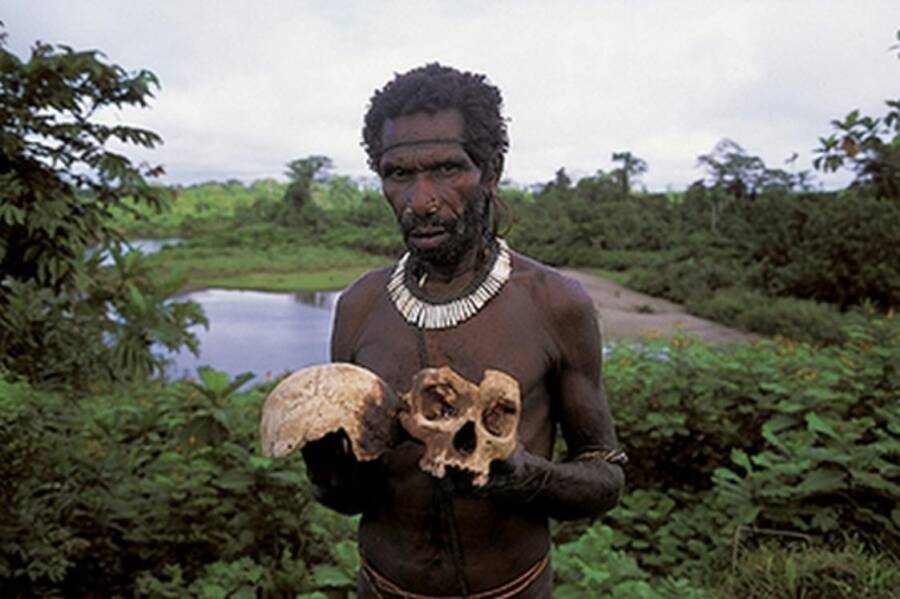
Paul RaffaeleOne of the Korowai tribesmen that Raffaele encountered holding a human skull.
Bailom explained that after the execution of the “khakhua,” he and other tribesmen chopped up the body, wrapped the parts in banana leaves, and cooked them “like we cook pig.” He and other men in the cannibal tribe — women and children do not participate in the ritual — eat all parts of the body aside from the bones, teeth, hair, nails, and penis.
Bailom claimed that the taste is similar to “young cassowary.”
Though Raffaele told Vice in 2014 that the more isolated clans up river continue to practice cannibalism, some have cast doubt on his claims.
In Smithsonian Magazine, Raffaele acknowledged that the cannibal tribe’s traditional practices have diminished, especially since several members were brutally punished by the Indonesian police in the 1990s. But the truth of the matter may go further than that — some claim that the Korowai tribe no longer practices cannibalism at all and only continues to tell stories to intrigue and frighten foreigners.
Raffaele, however, accepted the story he heard as fact.
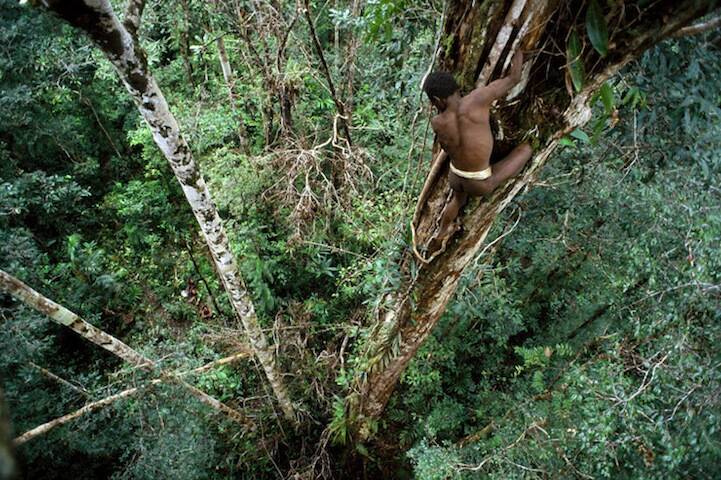
ThatToast/Wikimedia CommonsA Korowai man climbing a tall tree.
“Some readers may believe that these two are having me on — that they are just telling a visitor what he wants to hear — and that the skull came from someone who died from some other cause,” Raffaele wrote of his encounter with the alleged khakhua killers. “But I believe they were telling the truth.”
Perhaps the practice has diminished. Perhaps it’s disappeared. Either way, it goes to show the influence that the outside world has had on the Korowai.
An Isolated Tribe In The Modern World
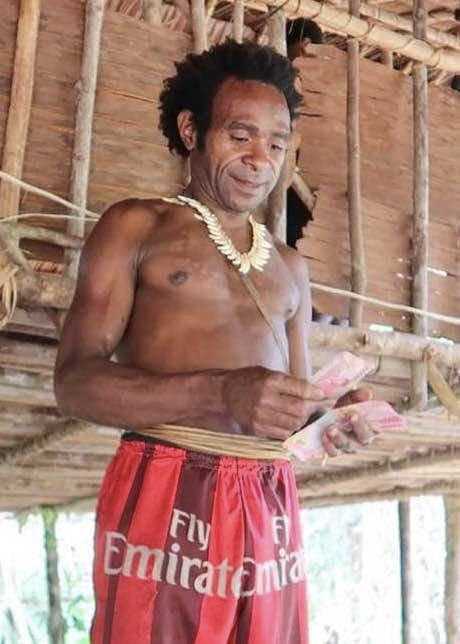
University of CambridgeA Korowai man counting money. The Korowai use currency to buy things in nearby shops like clothing and razors.
Today, life for the Korowai looks very different than it did 50 years ago. As Authentic Indonesia reports, many of them leave their traditional homes to attend school. Some find jobs as tour guides and boat drivers. Others even work on forestry projects for foreign companies.
The tribespeople have also been exposed to the concept of money since the 1970s, which they’ve come to adopt. The Korowai use cash to buy things like salt, clothes, and razors in nearby stores.
Indeed, the University of Cambridge reports that members of the purported cannibal tribe sometimes exaggerate their customs in order to make money from visitors. They’ve been the subject of over 50 television documentaries, and the university suggests that they perform “stereotypes” in order to earn a larger profit.
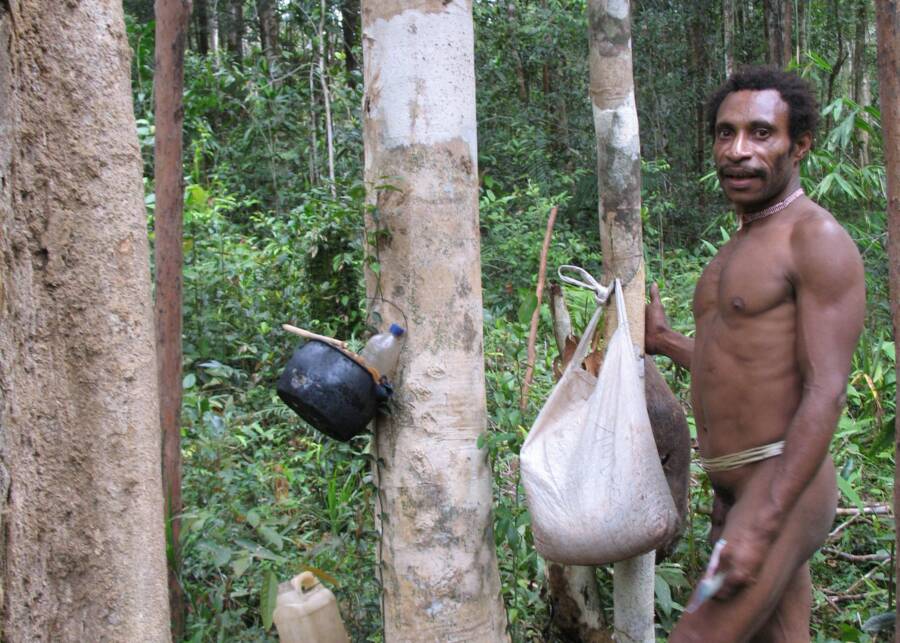
University of CambridgeA Korowai man hiding shop goods that he bought for his family ahead of a visit from a tour group.
The Korowai, though comfortable with clothing, will disrobe for a television crew, for example. They’ll even build extremely high treehouses for the cameras, even though they don’t actually live in them themselves.
“The money they make can buy imported consumer goods, like rice, noodles, steel tools, metal or plastic kitchen goods, and clothing,” Dr. Rupert Stasch, who learned about the Korowai through three years of fieldwork and has published a book and 30 articles about the supposed cannibal tribe, explained to the University of Cambridge. “They also want electronic devices like radios, and although there’s no phone signal they want mobile phones to play songs or games, and take photos they can post to social media when visiting towns.”
In the end, the story of the Korowai tribe is one of contradictions. Though long isolated, they’ve seemingly adopted many modern practices like using money, going to stores, and posting to social media. And some of the most eyebrow-raising claims about the tribe — their teetering treehouses and their alleged cannibalism — may not be true at all.
Perhaps the truth is impossible for outsiders to understand. Perhaps that’s something reserved for the Korowai, who live deep in the jungles of Papua.
After reading about the Korowai tribe and the claim that they practice cannibalism, go inside the strange story of Michael Rockefeller, the wealthy heir who disappeared — and may have been eaten by cannibals. Or, see what noted cannibals have said about the taste of human flesh.





